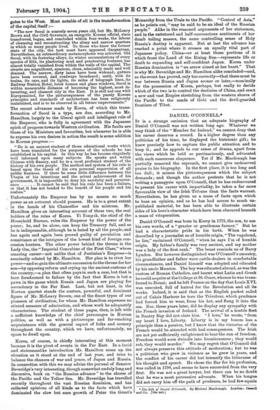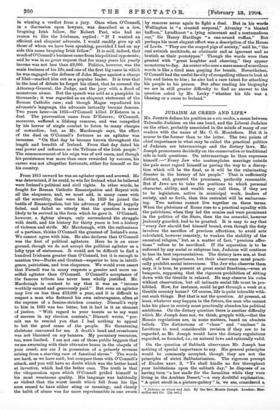Jr is a strange omission that an adequate biography of
Daniel O'Connell was not written long ago. Whatever we may think of the "Member for Ireland," we cannot deny that his career deserves a record. In a higher degree than any politician of his time, he displayed the histrionic gift; he knew precisely how to capture the public attention and to keep it; and he appeals to our sense of drama, apart from the views which he held so pertinaciously, and advocated with such rancorous eloquence. Yet if Mr. Macdonagh has partially removed the reproach, we cannot give undeserved praise to his biography. In the first place, it is too long and. too dull ; it misses the picturesqueness which the subject demands ; and though the author protests that he is not writing a panegyric upon O'Connell, that he has endeavoured to present his career with impartiality, he takes a far more favourable view of the Irish Tribune than the facts warrant. Nevertheless, he has given us a mass of facts upon which to base an opinion, and as he has had access to much un- published material, he has been able to illustrate certain sides of his hero's character which have been obscured beneath a mass of vituperation.
Daniel O'Connell was born in Kerry in 1775, the son, to use his own words, of a "grazier or gentleman farmer." But he had a characteristic pride in his birth. When he was described by a journalist as of humble origin, "The vagabond, he lies," exclaimed O'Connell, "when be says I'm of humble origin. My father's family was very ancient, and my mother was a lady of the first rank." The boast reminds us of Barry Lyndon. But however distinguished was O'Connell's ancestry, his grandfather and father were cattle-dealers in comfortable circumstances, and Daniel himself was adopted and educated by his uncle Maurice. The boy was educated abroad, as was the custom of Roman Catholics, and learnt what Latin and Greek he could acquire at the College at St. Omer, whence he was trans- ferred to Douai; and he left France on the day that Louis XVL was executed, full of hatred for the Revolution and all its works. Indeed, it is said that as the English packet sailed out of Calais Harbour he tore the Tricolour, which prudence had forced him to wear, from his hat, and flung it into the sea. Nor, three years later, did he display any sympathy with the French invasion of Ireland. The arrival of a hostile fleet in Bantry Bay did not elate him. "I love," he wrote, "from my heart I love, Liberty. Liberty is in my bosom less a principle than a passion, but I know that the victories of the French would be attended with bad consequences. The Irish are not yet sufficiently enlightened to bear the sun of freedom. Freedom would soon dwindle into licentiousness ; they would rob, they would murder." We may regret that O'Connell did not always preserve this attitude of moderation ; but he was a politician who grew in violence as he grew in years, and the conflict of his career did but intensify the bitterness of his thought and speech. He chose the Bar for his profession, was called in 1798, and seems to have succeeded from the very first. He was not a great lawyer, but there can be no doubt that he was a most persuasive advocate. When his tongue did not carry him off the path of prudence, he had few equals • The Life of Daniel CY Connell. By Michael Macdonagh. London I Gesell and Co. flea. net.] in winning a verdict from a jury. Once when O'Connell, in a discussion upon lawyers, was described as a low, broguing Irish fellow, Sir Robert Peel, who had no reason to like the Irishman, replied : "If I wanted an efficient and eloquent advocate, I would readily give up all those of whom we have been speaking, provided I had on my side this same broguing Irish fellow." It is said, indeed, that much of O'Connell's business came from his political opponents; and he was in so great request that for many years his yearly income was not less than £8,000. Politics, however, was the main business of his life, and one of the first big cases in which he was engaged—the defence of John Magee against a charge of libel—marked him out as a popular leader. It is true that in the heat of debate he forgot his client, that he covered the Attorney-General, the Judge, and the jury with a flood of monstrous abuse. But the speech was sold as a pamphlet in thousands ; it was regarded as an eloquent statement of the Roman Catholic case ; and though Magee repudiated his advocate's language, the advocate instantly became famous. Two years later—in 1815—O'Connell killed D'Esterre in a duel. The provocation came from D'Esterre ; O'Connell, moreover, suffered a lifelong remorse, and was compelled
by his horror of single combat to listen to many charges of cowardice ; but, as Mr. Macdonagh says, the effect of the duel on O'Connell's fortunes as an agitator was immense. "On that day be became known throughout the length and breadth of Ireland. From that day dated his real power and influence as the Tribune of the Irish people." The commencement of his reign was of evil omen, and though his persistence was more than once rewarded by success, his career was not altogether fortunate, either for himself or for his country.
From 1815 onward he was an agitator open and avowed. He was determined, if he could, to win for Ireland what he believed were Ireland's political and civil rights. In other words, he fought for Roman Catholic Emancipation and Repeal with all the eloquence, and, we must add, in many cases with all the scurrility, that were his. In 1829 he joined the battle of Emancipation, but his advocacy of Repeal happily failed, and failed so utterly that the question is never likely to be revived in the form which he gave it. O'Connell, however, a fighter always, only surrendered the struggle with death, and his history for thirty years is but a history of violence and strife. Mr. Macdonagh, with the enthusiasm of a partisan, thinks O'Connell the greatest of Ireland's sons. We cannot agree with him. He also declares that O'Connell was the first of political agitators. Here he is on surer ground, though we do not accept the political agitator as a lofty type of statesman. It would not be difficult to find a hundred Irishmen greater than O'Connell, but it is enough to mention two—Burke and Grattan—superior to him in intelli- gence, patriotism, and true eloquence. We would even assert that Parnell was in many respects a greater and more un- selfish agitator than O'Connell. O'Connell's acceptance of the famous tribute has never been wholly justified. Mr. Macdonagh is content to say that it was an "income worthily earned and generously paid." But even an agitator may live on less than £13,000 a year, and it is difficult to respect a man who flattered his own extravagance, often at the expense of a famine-stricken country. Disraeli's reply to him in 1835 was too bitter, but it had in it an element of justice. "With regard to your taunts as to my want of success in my election contests," Disraeli wrote, "per- mit me to remind you that I had nothing to appeal to but the good sense of the people. No threatening skeletons canvassed for me. A death's head and crossbones was not blazoned on my banners. My pecuniary resources, too, were limited. I am not one of those public beggars that we see swarming with their obtrusive boxes in the chapels of your creed ; nor am I in possession of a princely revenue arising from a starving race of fanatical slaves." The words are hard, as we have said ; but compare them with O'Connell's attack, and you will have no doubt which was the better hand at invective, which had the better case. The truth is that the vituperation upon which O'Connell prided himself is his most wearisome quality. His language was habitually so violent that the worst insult which fell from his lips soon ceased to have either sting or meaning; and clearly the habit of abuse was far more reprehensible in one sworn by remorse never again to fight a duel. But in his words Wellington is "a stunted corporal," Alvanley "a bloated buffoon," Lyndhurst "a lying miscreant and a contumelious cur," Sir Henry Hardinge "a one-armed ruffian." But perhaps his most elegant effort was a description of the House of Lords. "They are the soaped pigs of society," said he," the real swinish multitude, as obstinate and as ignorant and as brutish as their prototypes." Though the words were then greeted with "great laughter and cheering," they appear monstrous to-day. An orator who uses a mere mass of scurrilous words is like a tired man gasping for breath. Nevertheless, O'Connell had the useful faculty of compelling others to look at him and listen to him ; he also had a rare talent for attaching his people to his person. But after reading his biography we are in still greater difficulty to find an answer to the question asked by Mr. Lecky "whether his life was a blessing or a curse to Ireland."







































 Previous page
Previous page